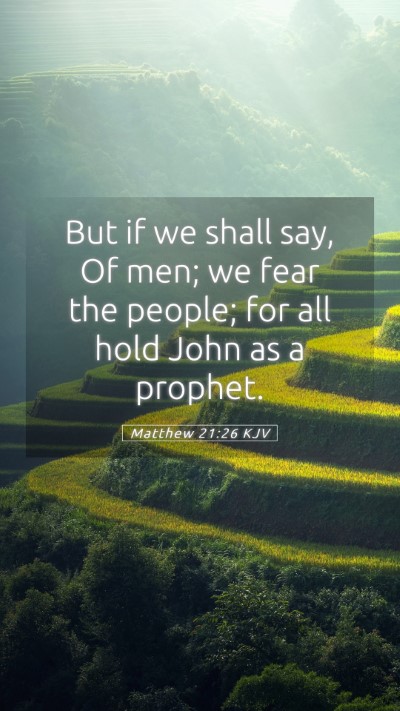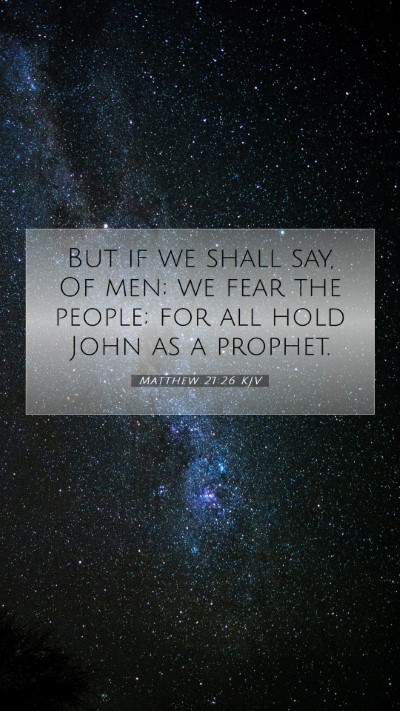Understanding Matthew 21:26
Bible Verse: Matthew 21:26
Verse: "But if we say, 'From men,' we fear the multitude; for all hold John as a prophet."
Introduction to the Verse
This verse occurs during an exchange between Jesus and religious leaders who challenge His authority. Understanding this verse involves exploring the motivations of these leaders and their fear of public opinion, along with Jesus' wisdom in navigating their trap.
Insights from Public Domain Commentaries
Matthew Henry's Commentary
Matthew Henry notes that the religious leaders are confronted with a dilemma. If they acknowledge John the Baptist's ministry as divine, they must accept Jesus' authority and prophetic nature too. However, if they claim it is of human origin, they risk inciting the public wrath, as the people revered John as a true prophet. This highlights how their fear of man and desire to maintain their power led them to a false interpretation of their circumstances.
Albert Barnes' Notes
Albert Barnes emphasizes the political implications of the Pharisees’ situation. Their unwillingness to answer Jesus directly illustrates how they prioritized their social standing over the truth. By referring to John the Baptist, they manipulated the situation instead of confronting their hypocrisy. Barnes points out that their fear of the crowds demonstrated their lack of faith and conviction.
Adam Clarke’s Commentary
According to Adam Clarke, this verse reflects the attitudes of the religious leaders who possessed an understanding of John’s significance yet were too cowardly to admit it publicly. Clarke suggests that the fear of the multitude rules their actions, showing their corruption. This fear becomes a significant theme in understanding the refusal to openly proclaim the truth, thereby leading them into further lies.
Thematic Elements
- Fear of Man: The religious leaders feared the reaction of the populace more than they sought the truth, revealing a critical lesson about the dangers of placing human opinion above divine authority.
- Hypocrisy: Their refusal to answer Jesus shows a facade of righteousness concealing their true intentions, encouraging readers to reflect on their genuine beliefs.
- Public Opinion: The fear of public backlash demonstrates how social pressures can influence decisions, leading to a failure to recognize and speak the truth.
Application of the Verse
This verse encourages readers to weigh the consequences of public opinion against personal convictions in their daily lives. It serves as a reminder that fear of man can lead to a neglect of truth. Christians are called to have the courage to stand firmly in their beliefs, regardless of societal pressures.
Cross References
- Luke 20:6: Similar context where religious leaders refuse to answer Jesus.
- Matthew 15:8-9: Addressing hypocrisy and outward appearances versus inward truth.
- John 12:42-43: Many believed in Jesus but were afraid to confess Him for fear of the Pharisees.
Conclusion
Matthew 21:26 serves as a profound reminder of the often complex interplay between truth, fear, and societal pressures. Through commentary from respected biblical scholars, we gain deeper insights and understanding of this verse, enriching our study and application of Scripture. As we seek Bible verse meanings and interpretations, may we approach our biblical studies with a sincere desire for understanding and courage to live out our faith authentically.


